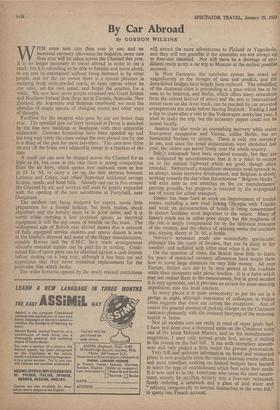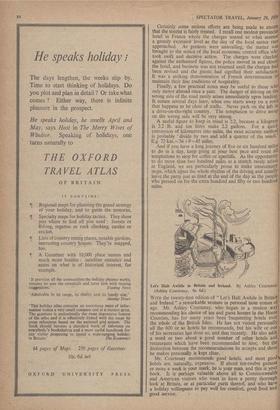He speaks holiday
The days lengthen, the weeks slip by. Time to start thinking of holidays. Do you plot and plan in detail ? Or take what comes ? Either way, there is infinite pleasure in the prospect.
He speaks holiday, he smells April and May, says Host in The Merry Wives of Windsor. Speaking of holidays, one turns naturally to
THE OXFORD TRAVEL ATLAS
OF BRITAIN
IT CONTAINS:
11 Regional maps for planning the grand strategy of your holiday, and to guide the motorist.
Specialty maps for holiday tactics. They show you where to find all you need : forests or fishing, regattas or rock climbing, castles or cricket.
11 Lists of country eating places, notable gardens, interesting country houses. They're mapped, too.
A Gazetteer with 10,000 place names and much more besides : sunshine statistics and notes on what is of historical interest, for example. Certainly some serious efforts are being made to ensure that the tourist is fairly treated. I recall one modest provincial hotel in France where the charges soared to what seemed a grossly excessive level as the day of the local motor race approached. As protests were unavailing, the matter was brought to the notice of the local economic control office who took swift and decisive action. The charges were checked against the authorised figures, the police moved in and closed the hotel, and business was not resumed until the charges had been revised and the guests had signified their satisfaction. It was a striking demonstration of French determination to maintain their fine traditions of hospitality. Finally, a few practical notes may be useful to those who only motor abroad once a year. The danger of driving on the wrong side of the road rarely arises immediately upon landing. It comes several days later, when one starts away on a road that happens to be clear of traffic. Never park on the left In a drive-on-the-right country. The temptation to drive awaY on the wrong side will be very strong.
A useful figure to keep in mind is 2.2, because a kilogram is 2.2 lb. and ten litres make 2.2 gallons. For a quick conversion of kilometres into miles, the most accurate method, is probably ' divide by two and add a quarter of the result. E.g. 72 km.=36 +9=45 miles.
And if you have a long journey of five or six hundred miles to do in a day, keep going at your best pace and resist all temptations to stop for coffee or aperitifs. As the opportunity to do more than two hundred miles at a stretch rarely arises in England, we are particularly prone to make unnecessary stops, which upset the whole rhythm of the driving and usually leave the party just as tired at the end of the day as the people who pressed on for the extra hundred and fifty or two hundred miles.
Let's Halt Awhile in Britain and Ireland. By Ashley Courtenay. (Ashley Courtenay. 8s. 6d.)
WITH the twenty-first edition of " Let's Halt Awhile in Britain and Ireland " a remarkable venture in personal taste comes of(t age. Mr. Ashley Courtenay, who began in a modest waY recommending his choice of tea and guest houses in the Home Counties, has for many years been frequenting hotels over the whole of the British Isles. He has not visited personally all the 600 or so hotels he recommends, but his wife or one of his secretaries has done so, and that recently. He also adds a word or two about a good number of other hotels and restaurants which have been recommended to hint; but the distinction between the recommendations he accepts. and those he makes personally is kept clear. Mr. Courtenay recommends good hotels, and most good1 hotels are, naturally, expensive. If about ten-twelve guineas or more a week is your mark, he is your man, and this is your book. It is perhaps valuable above all to Commonwealth and American visitors who want to have a pretty thorough look 'at Britain, or at particular parts thereof, and who have a holiday willingness to pay well for comfort, good food and good service. Those words are taken from a pamphlet published by the Migration Council which was founded in 1950 " to bring home to the peoples of the British Commonwealth and particularly of Great Britain the vital necessity for large-scale planned migration if the Commonwealth is to survive."
The Council is supported by men of different parties, diverse opinions and various professions. It is doubtful'if any other body in the world could display such a representative member- ship.
I quote from the pamphlet again: " The Council believes that the choice already facing Britain is as stark as this: 1. Either an organised, planned and directed re-deployment of a cross-section of people and plant, made`possible by large- scale investment in Commonwealth development; 2. Or a rapid and grave deterioration of the economic and political situation leading to an unorganised exodus of those who can emigrate, who would in such circumstances become a burden and not an asset to the Dominions, and to privation for the majority who remain."
To develop the Commonwealth's new materials, which are potentially the richest in the world, an annual investment of at least £500,000,000 is necessary. The actual expenditure by Great Britain on Commonwealth development and settlement from 1947 to 1953 averaged less than £500,000, and lest one should seem to be gibing at the Socialist Government let it be said at once that the expenditure by the Tory Government in 1953 fell to £134,136.



















































 Previous page
Previous page